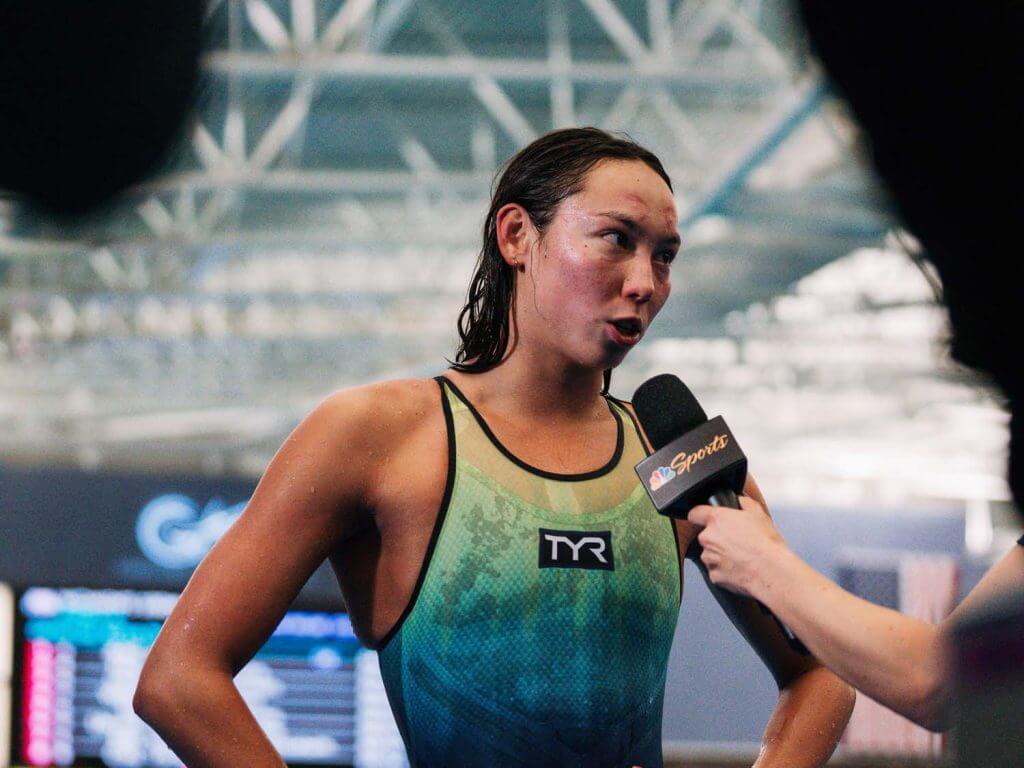Torri Huske Comeback Could Be Huge for U.S. Women’s Olympic Prospects

Torri Huske Comeback Could Be Huge for U.S. Women’s Olympic Prospects
In her breakout international performance at the 2022 World Championships, Torri Huske won six medals overall, including gold in the 100 butterfly and bronze in the 100 freestyle. She played a key part in four 400-meter relays (U.S. women’s and mixed) that reached the podium.
But relative to that high standard, Huske struggled during the 2023 summer season. She still qualified for Worlds, beating a field of U.S. swimmers in the 100 fly that saw four women break 57, and she won bronze in the event in Fukuoka, just behind familiar rivals Zhang Yufei and Maggie Mac Neil. But in the 100 fly final, she swam more than one second slower than her gold-medal time from one year before. As for relays, she was dropped from the finals squad of both the 400 free relay, and then, after a poor leg on the mixed medley relay, Gretchen Walsh took Huske’s usual butterfly spot on the women’s relay.
Fast forward four months to Huske’s next major racing appearance on American soil, and the feeling surrounding her performances is far more reminiscent of what she accomplished in 2022. At the U.S. Open, Huske beat her season-best times in three out of four races, missing by only three hundredths in the fourth race. In the one finals session, she actually swam a pair of personal-best times as she scored top-three finishes against tough American competition in both the 200 IM and 50 free.
A day later, up against Walsh and Claire Curzan in the 100 fly final, Huske went out under world-record pace, as she so often does, and held on to swim a time of 56.21, just three hundredths behind her season-best time and four tenths quicker than she swam in this year’s World Championships final. And this was the U.S. Open, not exactly a taper meet circled on swimmers’ radars. Suddenly, her 55-second form of 2022, the one she used to dominate a Worlds final, doesn’t look so far away as Huske prepares for what could be an epic Olympic final next year.
The change, perhaps something so simple and obvious: not taking classes. Huske admitted at U.S. Nationals that her sophomore year at Stanford had included a difficult academic load, taking more classes than she normally would at one time, and Stanford’s quarter system meant that her classes did not finish until just weeks before the selection meet. In a recent feature published in The Athletic, Huske admitted she would arrive at practice late while “huffing and puffing” when coming directly from class.

Torri Huske (center) between Claire Curzan and Gretchen Walsh at the U.S. Open — Photo Courtesy: Emily Cameron
But now, in the Olympic year, swimming is the only responsibility on Huske’s slate. “I’m taking a gap year this year, and I feel like that’s made a huge difference in my training,” Huske told NBC Sports in her post-race interview after the 100 fly win. I think it’s really easy to overwork yourself and load up on classes. It’s nice that I get time to recover this year.”
The next day, Huske swam the 100 free, the event where she dropped from individual World Championships medalist in 2022 to fifth at Nationals off the U.S. A-relay one year later. The field in the final included three of the four women who beat her head-to-head in July, Abbey Weitzeil, Gretchen Walsh and Olivia Smoliga, plus 2016 Olympic champion Simone Manuel and 2021 Olympic silver medalist Siobhan Haughey.
Huske beat all the Americans in that heat, coming in at 53.17 for a second-place finish behind Haughey. The time was merely a quarter-second behind her best time and significantly quicker than her summer pace (53.41). It’s a short jump from there back to 52-second territory and the ability to again be a force for the U.S. women in the 400 free relay, not to mention possible individual contention at major meets.
It’s the relay events where Huske, who turns 21 Thursday, can make the biggest impact. And key relay legs will be especially critical looking ahead to the Paris Games after the Americans did not win a single relay at the Fukuoka Worlds until the final two races of the meet.
Beating Australia in the 400 free relay looks like a pipe dream, but the American women have now captured four consecutive world titles in the 400 medley relay, albeit with a silver medal behind Australia at the Tokyo Games in between. At this year’s Worlds, with Walsh replacing Huske, Australia’s Emma McKeon closed the gap on the Americans with a 56.44 butterfly split, but Lilly King provided a breaststroke advantage of 2.14 seconds over the Aussies, more than the entire margin in a race the U.S. women won by 1.29 seconds.
Assume that gap shrinks next year, with Aussie breaststrokers Chelsea Hodges and Jenna Strauch both on the mend after injuries knocked them out of Worlds. A 55-second performance from Huske would go a long way toward reinforcing that edge in what will be by far the American women’s best chance at relay gold in Paris.
The mixed medley relay is far harder to predict than the single-gender events, particularly with so many potential roster combinations, but strong form by Huske would allow American men to handle the backstroke and breaststroke legs and build a strong lead with women’s butterfly speed to follow.
Looking for a boosted U.S. medal count at the Paris Olympics compared to the 2023 World Championships? Huske can provide that difference, and her results at the U.S. Open prove she is on track.

- PSYCH SHEET
- HOTEL INFORMATION
- LIVE RESULTS
- MEET INFO
- TV SCHEDULE
- DAY 1 PRELIMS RESULTS
- DAY 1 FINALS RESULTS
- DAY 2 PRELIMS RESULTS
- DAY 2 FINALS RESULTS
- DAY 3 PRELIMS RESULTS
- DAY 3 FINALS RESULTS
- DAY 4 PRELIMS RESULTS
- DAY 4 FINALS RESULTS
- DAY 5 PRELIMS RESULTS
- DAY 5 FINALS RESULTS
- DAY 6 PRELIMS RESULTS
- DAY 6 FINALS RESULTS
- DAY 7 PRELIMS RESULTS
- DAY 7 FINALS RESULTS
- DAY 8 PRELIMS RESULTS
- DAY 8 FINALS RESULTS
- DAY 9 FINALS RESULTS
- FULL RESULTS BOOK




GO TORI!! You’ve always been one of my favorite swimmers.